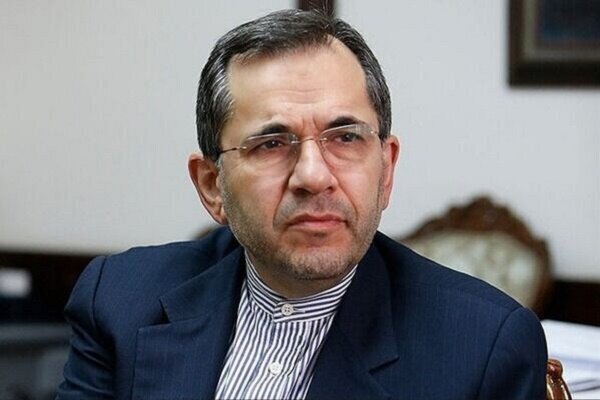Iran to U.S.: Objecting to ICJ ruling ‘not a good fresh start’

TEHRAN – Iran has criticized the U.S. for objecting the ruling by the International Court of Justice (ICJ) in which it has ruled it can hear a case brought by Iran against the U.S. in a bid to end sanctions that the Trump administration reimposed in 2018 after pulling out of the 2015 nuclear deal.
A majority of a panel of 16 judges on Wednesday found that the ICJ, also known as the world court, has jurisdiction in the dispute.
However, the U.S. State Department on Wednesday expressed displeasure over the ruling. The reaction by the State Department drew a response from Iran’s Ambassador to the United Nations Majid Takht-Ravanhi, saying this is “not a good fresh start.”
Hopes have risen for a revival of the JCPOA – the official name for the nuclear deal - now that the Trump administration is gone and the new Biden administration has said it will cherish multilateralism and diplomacy.
“New US admin purports to support multilateralism, yet is "disappointed" by @CIJ_ICJ rejection of its objection to case on US sanctions (on basis it is outside Court's jurisdiction),” Takht Ravanchi wrote on his Twitter account.
By quitting the 2015 nuclear deal, the Trump administration violated international law as the agreement is endorsed by UN Security Council Resolution 2231.
“US also violating UNSCR 2231 with illegal sanctions on Iran. Not a good fresh start,” Takht-Ravanchi remarked.
Lawyers for the U.S. argued at hearings last year that the case should be thrown out by the ICJ for lack of jurisdiction and admissibility but the court’s president, Abdulqawi Ahmed Yusuf, said that judges rejected U.S. arguments that Iran could not base claims at the ICJ on a 1955 bilateral friendship pact, known as the 1995 Treaty of Amity.
Judges found the treaty, signed decades before Iran’s 1979 Islamic revolution and the sharp deterioration of ties with the U.S., could be used as a basis for the court’s jurisdiction.
“The court unanimously rejects the preliminary objections to its jurisdiction raised by the United States of America according to which the subject matter of the dispute does not relate to the interpretation or application of the Treaty of Amity,” Yusuf said, according to al Jazeera.
=========== ‘Legal victory’
Iranian Foreign Minister Mohammad Javad Zarif referred to Wednesday’s decision as another legal victory for Iran.
“Iran has always fully respected international law. High time for the US to live up to its international obligations,” Zarif tweeted.
Iran has already filed a suit in the ICJ against the U.S. reimposition of unilateral sanctions as Washington withdrew unilaterally on May 8, 2018 from the nuclear deal, formally known as the Joint Comprehensive Plan of Action (JCPOA).
Earlier on Wednesday, the Iranian embassy in The Hague tweeted, "Today, the ICJ strongly rejected the U.S. preliminary objections and reaffirmed its jurisdiction to hear the case brought by Iran against the U.S. on violations of the 1955 Treaty."
"Previously in this case, the ICJ rendered an Order obligating the U.S. to remove any impediment arising from the measures announced on 8 May 2018 to the free exportation to the territory of Iran of medicines and medical devices; foodstuffs and agricultural commodities,” Iran’s diplomatic mission added.
Moreover, Saeed Khatibzadeh, spokesman for the Ministry of Foreign Affairs, said that the world’s top court had issued a decision in the case of violations of the 1955 Treaty of Amity, saying that the court rejected preliminary U.S. objections and considered itself competent to investigate the lawsuit against the U.S. government and thus the case would enter into substantive proceedings.
The ICJ issued its verdict in the case of violations of the 1955 Treaty of Amity on Feb. 3, 2021, Khatibzadeh said.
He stated that based on the evidence and legal defenses presented to the court by the legal team of the Islamic Republic of Iran with the participation of the Center for International Legal Affairs, the Ministry of Foreign Affairs, and other lawyers and advisors, the court rejected preliminary U.S. objections and considered itself competent to investigate the lawsuit filed against the U.S. government and thus the case would enter into substantive proceedings.
The second legal success was achieved in the proceedings of this case, which relates to the reimposition and escalation of inhumane U.S. sanctions against Iranians since May 8, 2018, with the issuance of this decision, he noted.
He further noted that the court issued an interim order in favor of Iran requiring the United States to remove any obstacles arising from sanctions imposed on Iran in the field of medicine and medical items, food and agricultural products, parts and services related to civil aviation safety previously on October 3, 2018, but the U.S. has so far refused to comply with the court's order in line with the policy of “maximum pressure” and economic terrorism against the Iranian government and nation.
The Islamic Republic of Iran has informed the court of the issue of pursuing the implementation of the interim order and its violations by the United States, now, with a court decision issued, there is an opportunity for the court to review the U.S. failure to enforce the interim order during the substantive proceedings, he reiterated.
“Although the verdict issued today relates to a competent phase, it shows the legitimacy of the Islamic Republic of Iran's demands at this stage of the proceedings, and with this success, the case will enter the final proceedings of the case,” he noted.
Khatibzadeh stressed, “The use of international legal mechanisms is part of the approach of the government of the Islamic Republic of Iran and the Ministry of Foreign Affairs in the application of the rights of the noble nation of Iran in the international arena, which has always been on the agenda of the ministry.”
EE/PA
Leave a Comment